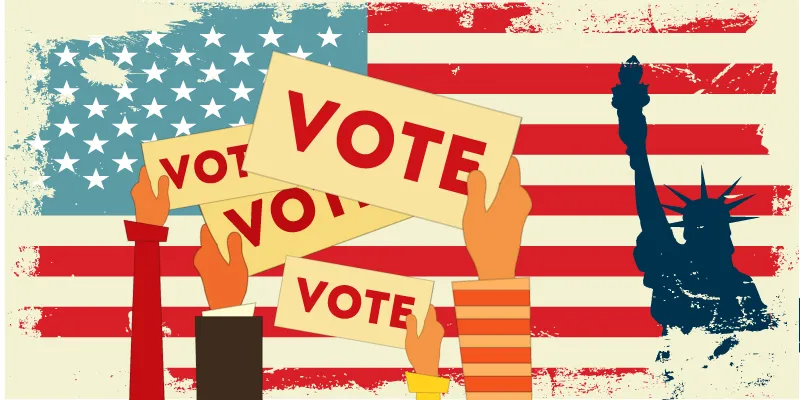What roles are startups playing in the current US Presidential elections
This new millennium has been all about breaking the barriers and expanding the frontiers of human thinking. While people from the 1990s preferred to stay in a cozy, secure eight-hour corporate job and follow the same routine day after day, the millennials are keen on venturing out of their comfort zones and experimenting with new stuff. While corporates were highly spoken of in the 20th century, currently, startups are dictating the headlines.
Startups have become ubiquitous, catering to every single need of a millennial, be it for a household need or a long-term goal, ranging from buying a safety pin online to helping politicians win elections. While there are a comrade of e-commerce startups serving the former purpose, the political domain is an untapped area for startups.
Political parties have also realised the need for technological implications in their campaign to reach out to difficult-to-reach voters and convert critical voter blocs.
Currently, the hottest topic doing its rounds is the US Presidential elections. Both Republican party and Democratic party are about to announce their US Presidential nominee. With the elections entering into the final lap, both parties are banking on startups to help them get an edge over their opponents.

How Hillary is using big data analytics to take her campaign uphill
One such startup backing Hillary Clinton to win is the GroundWork. Partly funded by Alphabet Inc.’s chairman Eric Schmidt, this startup makes vital use of data analytics and digital outreach to earn votes. GroundWork’s function is to ingest in loads of data and develop tools important for modern campaigning. However, not much information of how they curate the data has been disclosed. GroundWork’s CTO Michael Slaby played an important role in Obama’s 2008 and 2012 campaign.
In Obama’s 2012 campaign, the team built an electorate model and classified 15 million voters as undecided. They collected data about these undecided voters’ digital presence, the events they attended, money donated and assigned them a score on how much do they support Obama’s campaign. Based on these scores, advertising campaigns were held and emails were sent to these voters to gain their support. Another flagship technique adopted by the team was “Optimizer”.
Aiming to reach out to a larger set of voters in a cost-efficient method, this tool sent out television ads. This tool used information like programmes watched, time slots and set-top boxes used by the voters. The “Optimizer” saved the campaign close to $40 million, reports the team.
The wind’s not blowing on Trump’s side
Long Island-based startup 25k Startups have started a campaign called “Trump Your Vote” on Kickstarter, a fundraising platform, where they sell limited edition #TrumpYourVote tees. The team also plans on airing commercials supporting Trump’s election campaign. While Hillary Clinton has GroundWork, started in July 2014, supporting her campaign on the technology grounds, things are just not working for Donald Trump.
A recent occurrence, despite the Republican party offering a deal worth $1.3 million to Buzzfeed for featuring their party’s political ads on its website, Buzzfeed turned down the offer citing Trump’s campaign promises. Making it worse, a Chicago-based startup iKeedo is allowing its users to donate money to the non-profit political action committee MoveOn.org, which supports Bernie Sanders’ political campaign, every time Trump tweets.
How startups are working to better the polling experience
While some of the startups have sided with one party or the other, some have solely focussed on improving the whole election experience.
Agora, a startup with its grassroots leading back to an abstract idea in Harvard i-labs, helps citizens to take an active part in political talks. Citizens can live-stream political talks, post queries and connect with people with similar opinions. It’s an exciting prospect for politicians as well, for they can reach out to a broader set of audience and can also conduct hassle-free Q&A sessions. Agora recently streamed videos featuring talks by then presidential candidates Bernie Sanders, Carly Fiorina, and the likes. Election Systems & Software, World’s leading provider of voting equipment and services, has launched a product “Election Insights”. This product shall collect data on election days and offer solutions to election administrators on when to increase the staffing to provide a seamless experience to voters.
Another startup BallotReady addresses the rising concern of a low voter turnout. 2012 US Presidential Elections witnessed a turnout of 54.9 percent, with some regions’ voter turnout dipping to 42 percent. BallotReady attributes a low voter turnout to lack of reliable information about candidates, especially in local elections. This startup provides trustable info about all the candidates contesting in a specific region. This service would be tested in this year’s elections. NationBuilder is a startup that helps parties in designing websites, processing donations, and mailing to their donor databases. Both the Republican Party of Florida and Hillary Clinton have availed of this service.
“How much of a decisive role can a startup play in a political campaign?” was a question aptly answered by Obama’s 2012 tech team. With the current scenario not giving a clear advantage to either of the two parties, the startups on either side are to be counted upon to sway the electorate in the respective party’s favour.
Read More
The stealthy, Eric Schmidt-backed startup that’s working to put Hillary Clinton in the White House
7 Startups That Could Bring Election Day Into the 21st Century
Donald Trump Gets Support from 25K Startups Kickstarter Campaign







